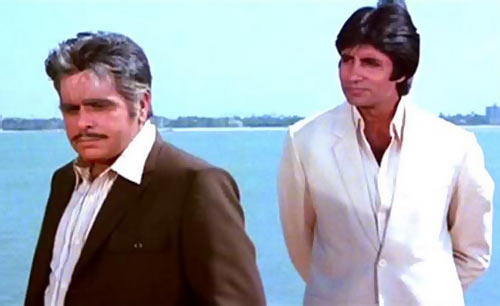
In our special series re-visiting great Hindi film classics, we look back at Dilip Kumar, Amitabh Bachchan starrer Shakti(1982).
'Ruk jao Vijay warna mein goli chala dunga.'
When I think about my earliest movie memories, the sound of Dilip Kumar's warning and the visual of him chasing Amitabh Bachchan at the airport tarmac leading to Shakti's heartbreaking climax comes foremost.
Even though I was much too young to understand the intricacies of their strained father-son relationship, my instincts rooted for Big B. And when his blood-soaked Vijay collapses in his duty-bound dad's arms, it was just too much agony for a kid, barely starting school, to bear. I began to writhe in pain and cried my eyes out, 'Vijay mar gaya. Vijay mar gaya.'
No amount of assurance from mother made me feel better, the concept of make-believe was new. It's only after she showed me Prakash Mehra's Sharaabi, I realised my dear Vijay, now Vicky, is alive and kicking.
With all my doubts put to rest, my brother and I would often enact the afore-mentioned sequence where he always got to mouth a mound of last words while my acting talent was limited to pointing a play gun and screaming 'Ruk jao Vijay.'
My point behind all this nostalgia is, Shakti (1982), directed by Ramesh Sippy, is special in more ways than one.

Following the success of Sholay and debacle of Shaan, Sippy roped in two powerhouse performers to helm a father-son tale and the idealogical conflict that distances them along the lines of Mehboob Khan's Mother India.
The Salim-Javed script, however, resonates better with the discord, among two brothers on different sides of the law, from Yash Chopra's Deewar. A couple of dialogues 'Jao pehle unse kaho sabse pehle mere khilaaf saboot laayein, gawah dhoondein' or 'In usool adarshon ka bojh uthane ka shauq jisse hai usse uthane do' pay subconscious tribute to the 1975 classic.
Besides these common motifs, Shakti has its unique, accomplished space.
The drama plays on the fragile psychology of a child (Master Ravi) led to believe his police officer father (Dilip Kumar) was willing to forsake him in the line of duty when kidnapped by some goons. At the same time, he develops an allegiance for the unlikely ally (an efficient Kulbhushan Kharbanda) of the bad guy (a lean mean Amrish Puri) for taking pity on him facilitating his escape.
Sippy doesn't dwell too much on the boy, focusing largely on the adult who grows up to be a disenchanted Amitabh Bachchan aimlessly kicking a tin while ambling about Marine Drive against the setting sun.
At a time when most Big B's introduction scenes involved applause-designed daredevilry or punch lines, his subdued entry in Shakti reveals the screenplay's intention to keep it dark, hard-lined.
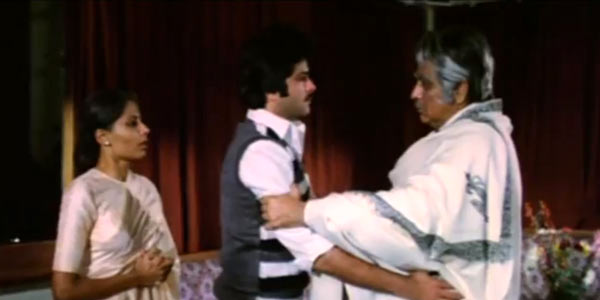
When Shakti came out, there was understandable curiosity among viewers to catch two of Hindi cinema's greatest legends in the same frame. Sippy was anxious to work with his favourite Dilip Kumar while Bachchan volunteered to play his rebelling son even though Raj Babbar was originally considered for the role.
Initially, the director planned to buy the rights of Sivaji Ganesan starrer Thanga Pathakkam but when his star writers began reworking the script, they came up with a brand new story. Except, there too, the father shoots his son in the end.
This tragedy is never a spoiler in Shakti, which begins with a flashback of Dilip Kumar's Ashwini Kumar, now a retired cop, recounting the events to his grandson (a raw, excited Anil Kapoor in a cameo) leading to that ill-fated night.
Interestingly, both Sholay and Shakti open and end with a shot of a train's arrival and departure at the railway station. Only Shakti, though critically-acclaimed, didn't attract that extent of box office glory.
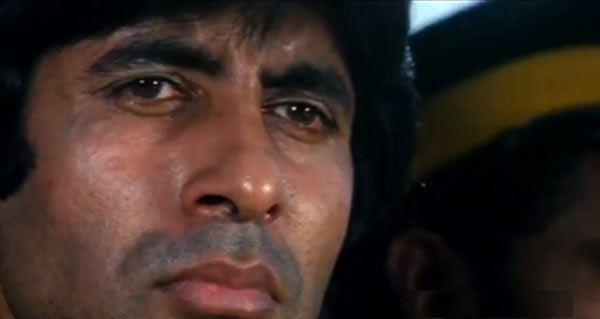
With the help of Salim-Javed's nuanced script, Sippy meticulously works on Ashwini Kumar's characterisation. Right in the beginning, when he feels shy in conveying to the nurse that he's the father of the newborn, one gets a whiff of the personality he is -- the kind who feels uncomfortable about public display of affections.
And later, when Vijay, his eight-year-old son, is held captive in exchange of releasing a criminal, the upright cop's refusal to cooperate reveals him to be the kind who holds his principles dearer than blood and is defined by his ethics.
To be fair to the father, I can't help thinking his outright noncompliance was just a tactic to unnerve the kidnappers and trace their whereabouts but an eight-year-old wouldn't understand that, would he?
When I saw the film as a kid, I completely sympathised with Vijay and failed to understand his father's ruthless stance. When I see the film today, I can only admire the difficult philosophy Ashwini Kumar adhered to and the unconditional support he received from his loving wife (Raakhee) especially when she reprimands her son with this hard-hitting Salim-Javedism, 'Main abhi itni kamzor nahi hoon ke apne pati ke imaandari ka bojh na utha sakoon.'
Such idealism is hard to find even in the movies today.
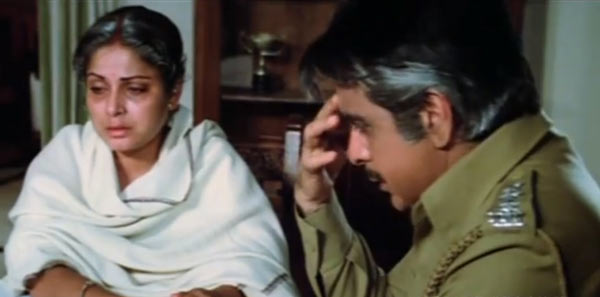
I harbour a love-hate relationship with Raakhee's Sheetal.
I wish her commitment to her husband wasn't so unquestioning. She could have bridged the gap of growing resentment and lack of communication between her husband and son long ago and saved their lives from irreversible catastrophe.
But in terms of artistry, Raakhee communicates the inadequacies of old school conditioning as well as the helplessness a woman caught in between with such touching vulnerability, you can only feel sad for her, never because of her.
Raakhee and AB share an exquisite chemistry. They've played lovers, best friends, poet and muse, bhabhi and devar and in Shakti, mother and son. There are various facets to their camaraderie, which radiates a sense of genuine affection, in any form, any relationship.
Barely 35, she conveys the maturity and emotionality of a senior citizen as Dilip Kumar's significant other with conviction.
In an interview to Rediff.com she says, 'I was enthralled by Dilip Kumar's body language. Even if it was a back-shot, we could see him emoting. There was something unique about his screen presence. When I got the chance to work with him (in Shakti) it was dream-come-true as well as a challenge to match him as his wife.'
Among its many memorable scenes is the one where Dilip Kumar reveals his vulnerable side and explains his professional devotion to his torn wife, 'Aur sivay is guroor ke mere paas hai bhi kya?'
The other leading lady of Shakti doesn't have as much to contribute but Smita Patil lends the quiet romance a credibility as AB's live-in partner with her attractive simplicity and straightforward disposition. She's equally home doing the stunning heroine routine against RD Burman's gorgeous melodies --Humne sanam ko khat and Jaane kaise kahan.
Shakti has only one other track -- Maangi thi ek dua, where the objective is to portray ecstatic parents raising their kid with hopes of him joining the police force.
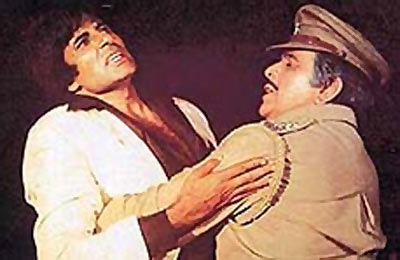
High on believable, gritty action (Mohammad Ali), S M Anwar's stark camerawork and RD's super slick background score, Shakti's biggest highlight, of course, is the coming together or rather the more promotion-friendly 'clash of the titans.' Every scene featuring a face-off between Dilip Saab and Bachchan is a case study in action-reaction not a petty box office calculation.
There is no need for theatrics, AB's clammed-up body language, downcast baritone and wounded eyes convey volumes when he says Main yeh baat *bhi* yaad rakhunga to his dad. There's a world of hurt hidden in that 'bhi'. Big B has done several drunken scenes but the tone here is decidedly bitter when he accuses his father of being married to his profession, 'Kanoon mera sautela bhai hai.'
On the other hand, Dilip Kumar's disappointed and misunderstood father paints an effective picture of a man struggling to reach out, unwilling to make concessions. In his own words, 'Farz nibhane ki purani aadat ho gayi hai.'
Regardless of the tensions, they're unable to conceal the warmth they truly feel towards each other as demonstrated at Sheetal's funeral. Both men don't utter a word but Vijay tightly grab's his father's hand and their collective weeping eyes has more depth than a heartfelt embrace.
Not to forget the unforgettable climax where a 40-year-old Bachchan tells a 60-year-old Dilip Kumar with child-like frustration 'Yeh toh hona hi tha, Dad' and they finally make peace for him to rest in some.
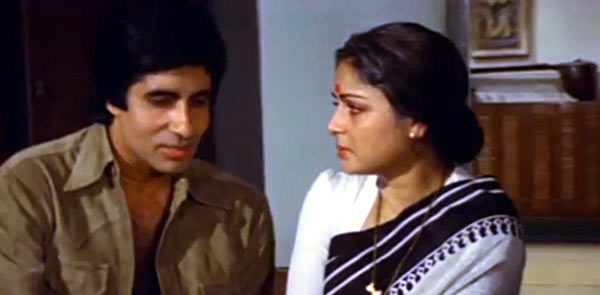
Never even once are these two perfectly cast actors an embodiment of their stardom, they're simply Ashwini Kumar and Vijay, two already larger-than-life characters -- one with his unflinching values, the other with his valid history of resentment, coping with an unfortunate distance that neither can overcome.
Those who walked into the theatre expecting a game of oneupmanship between two heavyweights were bound to feel underwhelmed. Shakti is not interested in superficial gimmicks. Nor is accommodating a happy ending to court the audience Sippy's style.
Easily one of Salim-Javed's best, Salim's personal favourite and Sippy's most underrated gem (given our propensity to unfairly judge everything he's made with the same barometer as the giant success of Sholay), Shakti is quite clear about who's the baap and who stays beta.
While there were suggestions that the latter was unhappy about his thunder being stolen by Dilipsaab's award-winning heroics, the thespian himself is dismissive of such idle talk. In an interview to Filmfare, he says, 'We shared very good vibes and contrary to gossip in the media both of us knew the profile of our characters and our scenes together before the film mounted the set.
Bachchan has equally fond memories of working with the veteran. He quite appreciates Dilipsaab's consideration for his co-actor's efforts, reprimanding anyone causing disturbance on the sets while AB rehearsed his lines.
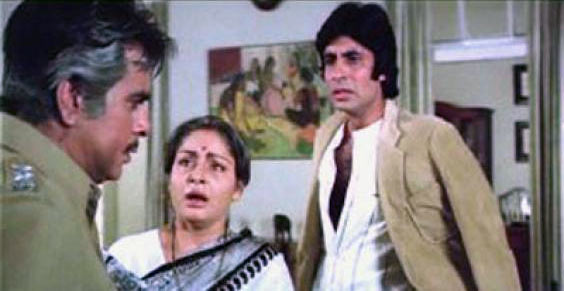
I could go on and on about Salim-Javed dialogues. Even the most simply said lines sting -'Main bhoolta nahi hoon' or 'Tumse kam badnaseeb nahi hoon main' in the context of the narrative.
During a chat session at rediff.com, co-writer Javed Akhtar mentioned how he's met many people in different parts of the world who believe Shakti is 'the best film written by our team.'
He continues, 'As far as the actors are concerned, quite often I'm asked that who I think was better. Personally, I believe that creative arts are different from wrestling or boxing. In acting you don't work against your co-actor but work with him. And their co-ordination was superb.'
Therein lies the strength, the shakti, the showmanship of Ramesh Sippy's magnificent father-son yarn.